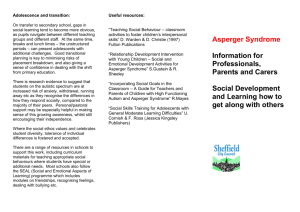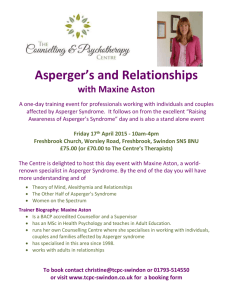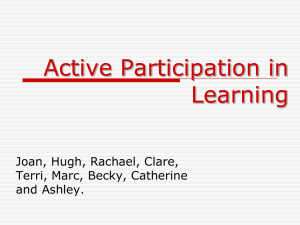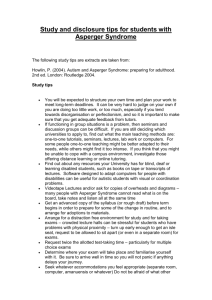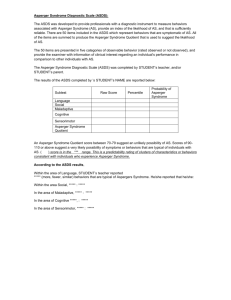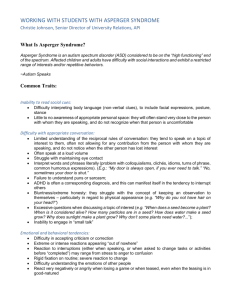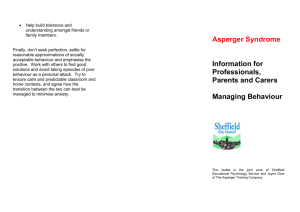Autism & Secondary School
advertisement
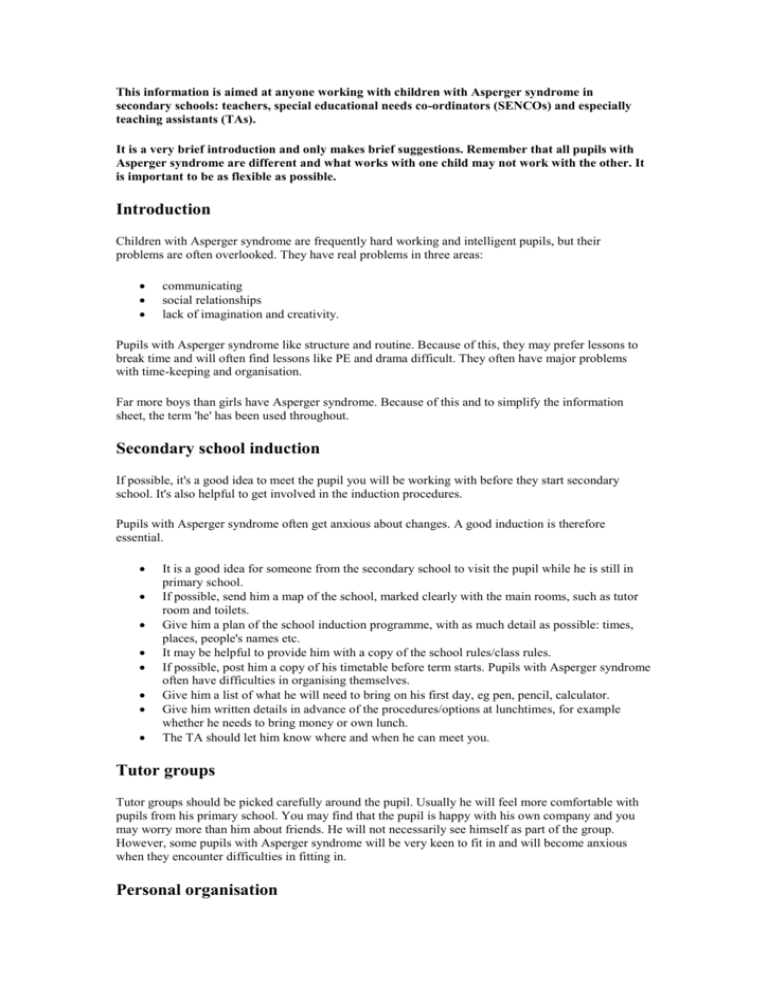
This information is aimed at anyone working with children with Asperger syndrome in secondary schools: teachers, special educational needs co-ordinators (SENCOs) and especially teaching assistants (TAs). It is a very brief introduction and only makes brief suggestions. Remember that all pupils with Asperger syndrome are different and what works with one child may not work with the other. It is important to be as flexible as possible. Introduction Children with Asperger syndrome are frequently hard working and intelligent pupils, but their problems are often overlooked. They have real problems in three areas: communicating social relationships lack of imagination and creativity. Pupils with Asperger syndrome like structure and routine. Because of this, they may prefer lessons to break time and will often find lessons like PE and drama difficult. They often have major problems with time-keeping and organisation. Far more boys than girls have Asperger syndrome. Because of this and to simplify the information sheet, the term 'he' has been used throughout. Secondary school induction If possible, it's a good idea to meet the pupil you will be working with before they start secondary school. It's also helpful to get involved in the induction procedures. Pupils with Asperger syndrome often get anxious about changes. A good induction is therefore essential. It is a good idea for someone from the secondary school to visit the pupil while he is still in primary school. If possible, send him a map of the school, marked clearly with the main rooms, such as tutor room and toilets. Give him a plan of the school induction programme, with as much detail as possible: times, places, people's names etc. It may be helpful to provide him with a copy of the school rules/class rules. If possible, post him a copy of his timetable before term starts. Pupils with Asperger syndrome often have difficulties in organising themselves. Give him a list of what he will need to bring on his first day, eg pen, pencil, calculator. Give him written details in advance of the procedures/options at lunchtimes, for example whether he needs to bring money or own lunch. The TA should let him know where and when he can meet you. Tutor groups Tutor groups should be picked carefully around the pupil. Usually he will feel more comfortable with pupils from his primary school. You may find that the pupil is happy with his own company and you may worry more than him about friends. He will not necessarily see himself as part of the group. However, some pupils with Asperger syndrome will be very keen to fit in and will become anxious when they encounter difficulties in fitting in. Personal organisation Be patient! Personal organisation is much more difficult in secondary than in primary school and a pupil with Asperger syndrome often finds this very difficult. He may use a number of bags or pencil cases. If possible, he should have a locker. Allow extra time at the end of lessons for recording homework. He may take a long time to pack up at the end of lessons and become upset if he has to push things into his bag in a hurry. It's a good idea to have an enlarged photocopy of his timetable pinned up at home. The copy in the homework diary can be too crammed to be helpful. Routines Pupils with Asperger syndrome like regular routines and can get upset with changes. Help him by telling him on a daily basis of any changes, eg in rooms or teaching staff, though this may not always be possible. Forthcoming events should be written in his planner and all relevant details noted in good time. A home/school book will be invaluable for messages. You may well find that he only remembers what he wants to. Beware of information overload. He may not be able to take everything in! Communication This is a common difficulty for pupils with Asperger syndrome. They may speak fluently and use long words, but often their speech will lack content and direction. They usually want to speak only about things important to themselves and need help in speaking and listening skills. Their tone may also be inappropriate or too loud. Encourage social greetings and insist on a reply. Try to avoid rushing your pupil. Give him a time to speak to you later in the day, if you can. Don't expect eye contact or appropriate facial expression. Avoid jokes and sarcasm. Pupils with Asperger syndrome interpret things in a very literal way and they may not understand the humour. Jokes can be worked on, if you have time and patience. Unusual behaviour A pupil with Asperger syndrome may have odd behaviour - pacing, flapping or strange facial gestures. Don't worry about these. They are usually signs of stress and pacing actually helps relieve stress. Try to encourage his peers to be understanding. If a behaviour is particularly disruptive in class, eg loud banging on the table, try to encourage a similar but less disruptive behaviour, eg drumming fingers on legs, rather than prevent the behaviour. Some young people with Asperger syndrome may not understand that other people cannot tell what they are thinking, and this can lead to frustration when you do not understand them. Social interaction Pupils with Asperger syndrome may appear arrogant, stubborn or even rude because of their communication difficulties. It is best not to take this personally. Instead point out gently what is and what isn't acceptable. Be consistent in this guidance. It is important also to let him know when he approaches or touches people in an inappropriate way. Any problems should be addressed and monitored, with the help of outside agencies if necessary. Bullying This can often be a problem for pupils with Asperger syndrome, especially in the early days at secondary school, as these pupils can appear very 'different'. Encourage the class to form a buddy system, as the pupil may not notice when others are lying or playing a trick. Make sure that all bullying incidents are correctly reported and dealt with. Insist that it is ok to 'tell' on bullies. It may be helpful for the pupil to leave class a few minutes early, especially if he is carrying a musical instrument, in order to avoid crowds in stairs and corridors. Some young people with Asperger syndrome can intimidate and hurt other pupils, either because they do not understand when they are making others uncomfortable or because their interests can be dangerous, eg wrestling. This type of difficulty needs careful handling by support staff. In the classroom Lessons Pupils with Asperger syndrome are often very able and the three Rs (reading, writing, arithmetic) are unlikely to be a problem. However, they may have difficulties with planning their work. Abstract thinking also often causes problems and, given a choice, they generally prefer fact to fiction. More able pupils with Asperger syndrome are likely to have an excellent memory and will astound you with their knowledge of some topics, especially those that interest them. They often think in a very literal, concrete way and need precise guidance. Even terms like 'tomorrow' or 'next week' may give rise to misunderstandings. Ideas are often hard to put on paper. Encourage your pupil to 'brainstorm' and take notes. Empathy can be a hard concept, so avoid asking him to write a story in another role. He may have problems in understanding the feelings of others and should be allowed to write straightforward factual accounts whenever possible. Any subject that needs imagination or pretence will cause difficulties, eg English language. Subjects that require abstract thinking and speculating will also cause difficulties, eg religious studies. Take time to explain hidden meanings, for example, in studying poetry. Making choices is also difficult, including multiple choice questions. Despite problems with imagination, role-play in group activities tends to work well, eg teacher/pupil/head teacher scenarios. This encourages his imagination, ideas and turn taking. He is unlikely to decorate a piece of work unless you tell him to. Lessons like PE and drama are often difficult because they may be less tightly structured and involve more social interaction than other lessons. A pupil with Asperger syndrome may prefer to follow his own interests rather than those of the class and may get upset if forced to participate. More able pupils with Asperger syndrome may question obsessively and your answers will rarely satisfy! Some helpful ideas Simple instructions written at the top of the page of the pupil's exercise book will lead to a more carefully structured lesson. This will also stop him becoming anxious about the next task. Avoid yes/no answers. Encourage fuller answers. Train him in the wording used in exams. For example, in your own words. Don't give him the opportunity to refuse. Encourage him to identify his needs and to be as specific as possible. Take his comments at face value and encourage him to expand. For example, if he says something is broken, reply: "Yes, it is. Now what would you like me to do?" However, this can be difficult if the teacher is talking as it could distract other pupils, so diplomacy is essential. Encouraging appropriate behaviour in the classroom Avoid distractions Children with Asperger syndrome are easily distracted. Try not to sit him next to a window, radiators, doors with windows or too close to a wall display. He may withdraw into a complex inner world more intense than day dreaming. His world is much more interesting than his task! The TA should keep reminding him to stay on task. Routines Because pupils with Asperger syndrome like routine, they get upset in a disruptive class and will be overwhelmed when things are not correct or don't go as expected. More able pupils with Asperger syndrome will follow rules slavishly and refuse to tolerate those who do not. Choose groups and seating with care. Make sure there is somewhere available for time out. Encourage him to use this space appropriately, when he is becoming over-stimulated or frustrated, rather than just as a punishment. Unlike other pupils, those with Asperger syndrome will be unlikely to find time out punishing. Instructions Don't expect a pupil with Asperger syndrome to know how to behave. You will have to tell him what to do. For example, in a school play you will have to explain exactly when to clap. Keep your instructions short and simple. Be clear and precise. Use clear, unambiguous sentences. It will help to write down instructions for the pupil to keep. He will find body language and facial expressions hard to interpret. He will not pick up on subtle clues of displeasure such as head shaking. Social StoriesTM can be a great help. Try to anticipate potential worries such as fire alarms or what to do when it rains at lunchtime. Don't expect him to respond to an instruction given to the whole group. Be ready to deal with major worries. These may vary from when it will rain next to germs in his food. Motivation Be prepared for lack of motivation for school work in areas in which he is not interested. Watch out for signs of day-dreaming. Develop a task/reward system. Negotiate a treat when a reward is due to stimulate work. The reward could be as simple as a free choice of a book to read. Try to develop a task sheet. The pupil will often question the relevance of a task. Point out that your request is a rule that has to be followed. Watch out for lack of spontaneity in exploring new situations. Try to introduce new vocabulary before starting a new topic. When keeping him on task, keep questions simple. Always expect to arrive at a satisfactory answer, even if this means rephrasing or extra steps. Once he has understood, repeat the original question. Give him time to process information and, if he cannot answer a question straight away, give him a minute or two and then ask the same question again, using the same words. School trips These have to be planned well in advance. Use the school planner to communicate with parents at an early date. Give all details to them and a copy to the child. Mark down the date etc in the pupil's school planner and be prepared for endless questions. Children with Asperger syndrome often have major problems with time keeping. Allow for this in your planning. Special interests Many people with Asperger syndrome have all-consuming interests, often unusual ones. Be prepared to be 'talked to' in great depth. This can be a problem during a very structured school lesson. Try suggesting that the pupil comes to tell you about this at lunchtime "because we need to be going to/listening/concentrating on..." Give clear feedback to the pupil, eg "Well done, that was a great speech. Now look at me while I answer. " It can be hard to change the subject. Try: "We're not talking about. now. John's telling us about. It might not work every time but it's worth a try." Other problems in the classroom Pupils with Asperger syndrome often have problems with neat presentation and legible handwriting. Tape recordings of homework can also help, though this is not always possible. However, they are often very good at IT and laptops can be a great help. They have poor social skills and find turn-taking hard. They are frequently clumsy and find PE a particularly difficult subject. Conclusion Remember: don't try to change the child. Where possible, adjust the surroundings to suit him, but encourage social interaction and inclusion. All this may sound a great deal of work for just one child. But the extra work needed for children with Asperger syndrome will also benefit the other children in the class. Recommended reading Leicester City Council and Leicestershire County Council (1998). Asperger syndrome - practical strategies for the classroom. The National Autistic Society Lalli Howell (2004). Exam advice for young people with autism and Asperger syndrome: guidelines for examiners, teachers, parents and pupils. The National Autistic Society Patricia Thorpe (2003). Moving from primary to secondary school: guidelines for pupils with autistic spectrum disorders. The National Autistic Society
